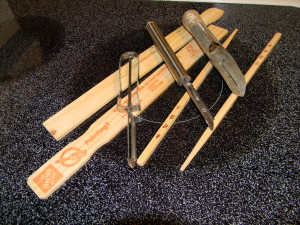My mother was a good, old-fashioned home cook. She also never learned to drive. Since we lived in the country much of the time, she knew how to make do with the ingredients and tools that were already on hand.
If she didn’t have spaghetti on hand, she would use flat noodles with Marinara, meat and cheese. She flattened out chicken breasts with a frying pan (and worked off some frustration with her kids, I think). A favorite recipe in our house is still a Chili Sauce that uses apples as well as tomatoes for a sweet and spicy addition to ground beef. Mom usually had a pot of soup on the stove made out of oxtails, ham bones, turkey carcasses or whatever meat she had on hand. (As kids, she didn’t dare tell us what was in the soup. We only knew that it was good!) She graduated eventually to be become restaurant cook but she still did her best work without the fancy gadgets that have become standard in many modern kitchens.
I don’t have my mother’s skills when it comes to cooking, but I have learned her respect for good, simple tools.
- Knives should be kept sharp and safe. A magnetic strip on the wall above the counter will keep metal knives safe, dry and conveniently at hand. These magnetic strips can be picked up at most hardware stores as they are commonly used for tool benches.
- A good variety of large spoons, ladles and spatulas is a must. Many can be picked up very reasonably at thrift stores or garage sales. Watch for brand name items at a bargain.
- Multiple cutting boards mean less chance of cross contamination. Sterilize cutting boards regularly.
- Old tools don’t need to be tossed out just because there is a new version, unless it is broken. If there is room to store them, multiples can make prep work more fun! It can become a contest between siblings or a chance to sit and visit with your spouse. “Show and tell” works especially well with kids when they have their own tool that won’t be taken away if they are “too slow”.
Here are also a few favorite adaptations learned along the way:
- Keep a clean pair of paint stirring sticks in the kitchen drawer. When rolling out cookie dough, position the stir stick so that they raise the rolling pin and ensure the same thickness cookie with each cut. When the thickness is uniform, the cookies will bake evenly and you won’t end up with doughy middles and crispy edges. If the paint stirrer gets grungy, toss it out and head to the hardware store.

Paint Stirrers, Chopsticks and a Variety of Apple Peelers. I am ready for making Gingerbread Christmas Ornaments! - A pair of chopsticks is a great way to poke nice round holes into the tops of gingerbread (and other) cookies so they can be hung with a ribbon.
- A 10 or 12 inch Fry Pan lid can be used as a “giant” cookie cutter for pie dough. It will create a perfectly round piece of dough for the top crust. This will give a neat edge to turn when finishing the top crust.
As you can tell, good tools are an inexpensive way to make cooking fun, social and sustainable. If you have other tips and or adaptations that you have tried in the kitchen, I would love to hear from you. Please share them by adding your comment to this post or contacting John at [email protected].

Pegg—I like the paint stirrer idea. Bill
Thank you. I am not always very consistant when rolling out thin, delicate things and this adaptaton solved the problem neatly.